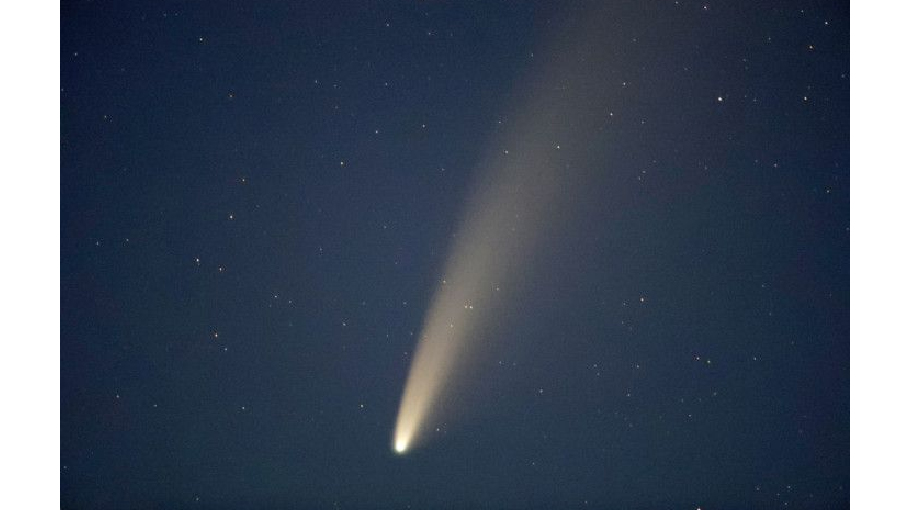On visiting comets, collapsing stars and bumbling humans

Maybe there are indeed more things in heaven and earth, as Hamlet put it, than are dreamt of in our philosophy.
On February 2, a comet, dubbed by astronomers C/2021 E2, will swing by our cosmic neighbourhood while hurtling through its seemingly endless elliptical orbit around the centre of the Solar System.
The last time Comet C/2021 E2 graced Earth’s night skies was 50,000 years ago, a time when the Sahara Desert was lush, fertile land, Neanderthals walked the Earth, and man had not yet domesticated animals or invented the plough.
From ill omens to poems
Long gone are the days when, in ancient times, comets caused widespread fear, considered as they were omens heralding natural disaster and social turmoil. In our time, we see them as wondrous visitations from places far, far away where no man, as it were, had gone before. Indeed, we see them as being so wondrous that we’ve adopted them as metaphors in our poetic fashions of semantic expression. (“Like a blazing comet I have traversed infinite nights, interstellar spaces of the imagination ... “, wrote lyrical Italian novelist Antonio Tabucchi.)
That’s all well and good. But given the way humans have made a hash of the role they were expected to play in the natural order, it looks like next time this comet drops by for another visit 50 millennia from now, our species will have long, long since become forgotten dust.
The reason we have, ever since we acquired consciousness of our human being, evinced such fascination with “what’s out there” in the universe, including our fascination with mere hurtling chunks of primordial dust, ice and rock we call comets, is simply because we are of and from “what’s out there”.
“We are made of star-stuff”, wrote Carl Sagan, the celebrated astronomer and popular science commentator (d.1996). “The cosmos is within us”. Earth was turned into Earth, and finally into the singularities that became each one of us — in that one trillionth of a second it took the Big Bang to explode. We are star-stuff through and through. The nitrogen in our DNA, the calcium in our teeth, the iron in our blood and, well, darn it, even the carbon in our apple pie were all made in the interior of “collapsing stars”, Sagan told us.
And it is collapsing stars, as they relate to collapsing civilizations, worlds and in the end species, that concerns us here.
If we as a species are made of the stuff of stars, then the model here would be that of stars which, after they had had attained a critical mass, collapse inward. In short, if cultures become possessed of a longing for violent dissolution once they have reached a certain threshold of complication, then it follows that the species that birthed them will do the same.
What happens when C/2021 E2 returnsIt is not unreasonable to suggest that our human species may already have reached that threshold. Should you consider this a phantasmagoric script, consider how not so long in recent times human beings lunged at each other in two world wars, killing some 70 million members of their own kind in labour camps and fierce battles between 1914 and 1945; and in our present time these same beings are now deliberately, calculatedly and wantonly destroying the environment that sustains their very own survival. All of which brings to mind Arnold Toynbee’s claim that “civilizations die of suicide, not by murder”.
If we are doomed — programmed somewhere in our neurological system, as it were, to implode — and our doom is preordained, then what is the point of it all?
Search me. All one can say is that, were we to reference William Shakespeare again, humankind may be, after all, what the bard called it in Macbeth’s soliloquy, nothing but “a walking shadow, a poor player that struts and frets his hour upon the stage and then is heard no more”.
There’s enough ennui here to turn us into despairing existentialists. Or perhaps to turn us to our Holy Texts in search of what really is the meaning, the purpose and the value of human existence.
One thing, however, is plain: When Comet C/2021 E2 returns to our neck of the woods 50,000 years from now — a blink of an eye in the temporal scheme of the cosmos — nature will have long triumphed over the challenges of reordering its domain in the wake of the mess we left behind — without us being around to bug the bejesus out of it.
Fawaz Turki is a journalist, academic and author based in Washington.
Gulf News



